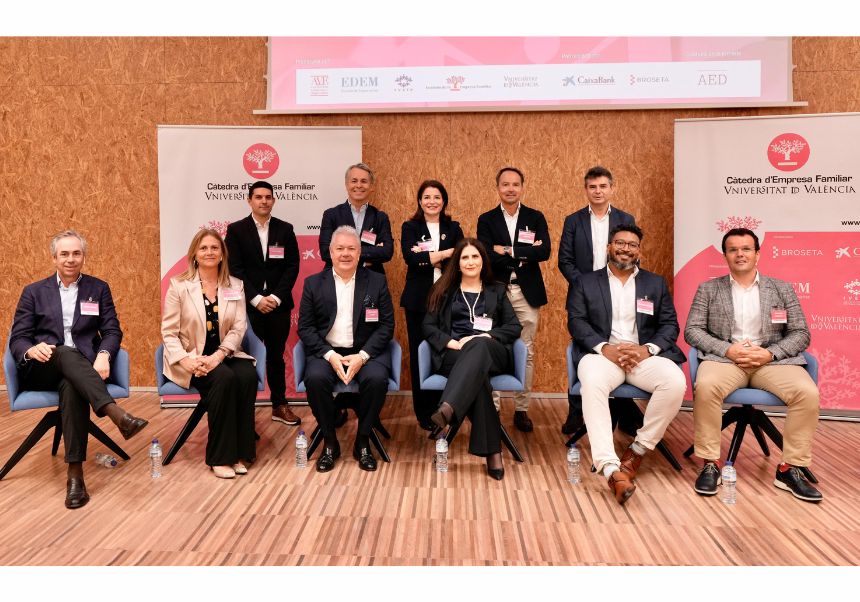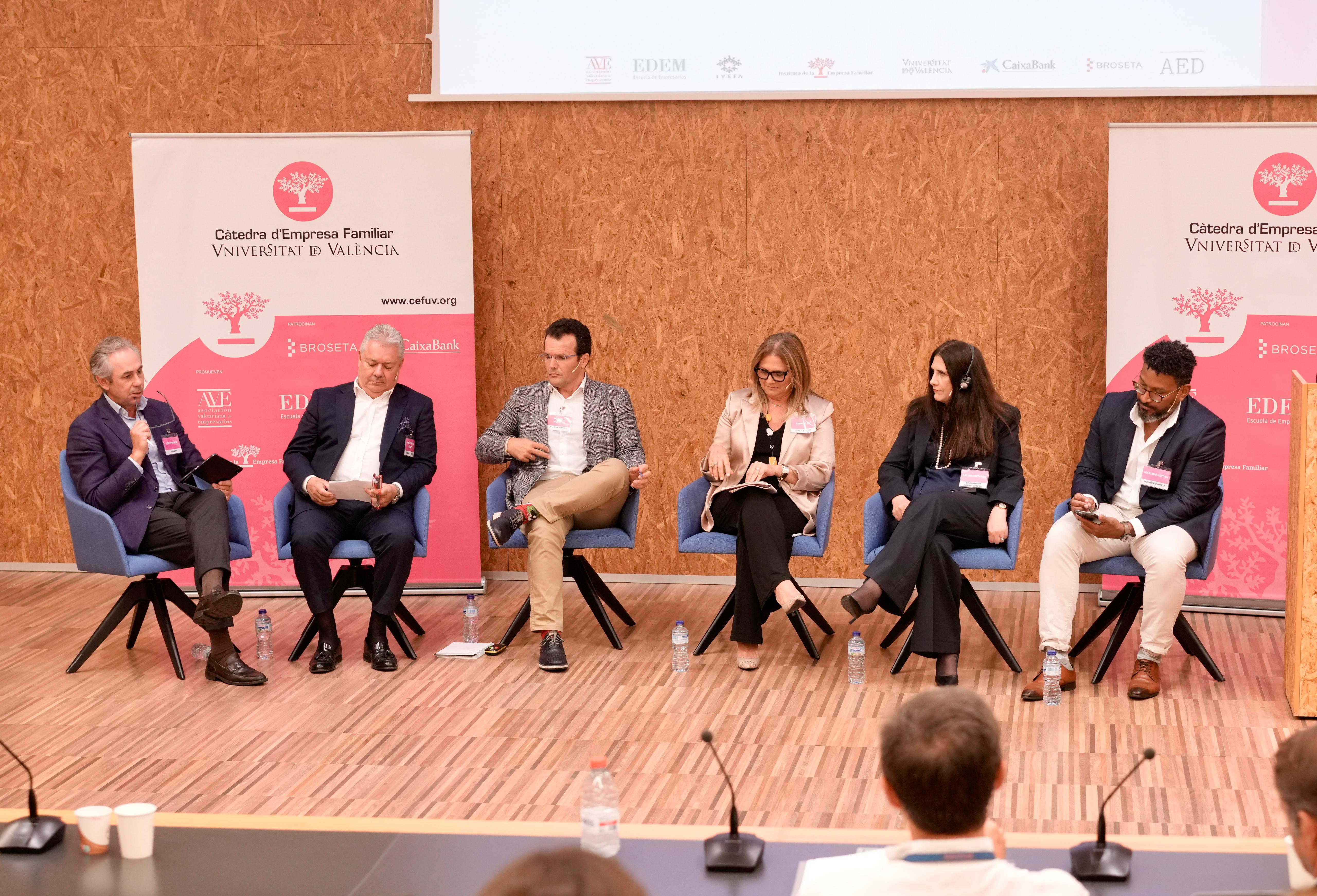
The Chair of Family Business of the University of Valencia (CEFUV) promoted by the Valencian Association of Entrepreneurs (AVE), EDEM Business School, the Valencian Institute for the Study of Family Business (IVEFA), the Institute of Family Business (IEF) and the University of Valencia (UV), and sponsored by CaixaBank and Broseta, has organised the VII Conference on Family Businesses in the World. On this occasion, it has counted on the special collaboration of the Spanish Association of Executives (AED), to present and debate on the attraction of management talent, the management of diversity in management teams, and the tensions between change and continuity in the teams of family businesses.
The conference was opened by the president of EDEM Escuela de Empresarios, Hortensia Roig, who emphasised: "We believe that life is a continuous learning process. A necessary factor to grow and survive in a fast-paced and ever-changing environment is education, because we must be constantly training ourselves". He also added that the key is that "the longest-lived and strongest family businesses are not those that do not have problems, but those that, even when they do, know how to solve them".
This year, to analyse the case of Australia, Professor Mariano Heyden of Monash University (Australia) presented "The Changing Face of Top Management in Family Businesses: Tensions of Continuity and Change". During his presentation he highlighted a significant evolution in the management of family businesses.
Professor Heyden pointed out that, traditionally, "the major concern of family businesses was the choice of successor within the family. However, recent reports reveal a change in trend: an increasing proportion of family businesses are willing to hire external CEOs, keeping ownership within the family".
Referring to this study, Heyden stressed that "55% of Spanish family businesses are not run by family members. This change responds to several key factors that influence succession within these companies, including family harmony, availability and development of leadership, specialisation in human capital, perceived employment opportunities and the merger of assets. The phenomenon of discontinuous family leadership succession is increasingly likely.
As conclusions of this first presentation, it was stressed that "family businesses cannot afford to think about the succession of the next generation, but at least two generations ahead".
Next, Laura Constanzo, professor at Southampton Business School, presented the case of the United Kingdom with the paper "Decision-making in the context of the family business". In her speech, she highlighted the positive aspects of decision-making in family businesses, despite the common criticism of their inefficiencies.
Costanzo underlined that, "although inefficiencies in family businesses are often talked about, these organisations have many advantages in terms of speed and efficiency in decision-making. These advantages are mainly based on trust, harmony, benevolence and commitment, values that are fundamental to the organisational culture of family businesses".
However, Costanzo also pointed out that "clinging to past successes, accumulating resources and maintaining harmony and continuity can be seen as incompatible with an entrepreneurial orientation". In addition, he stressed the complexity of management in family businesses, which must consider different perspectives: family, ownership (especially if separate from the family, although this is not common) and management.
In order to debate and analyse these challenges for the talent, management teams and middle management of family businesses, a round table discussion took place, in which, in addition to the professors, the family businessmen José Vicente López (CEO Mercadalia Group), Marcelo Montilla (VP Strategy & Business Process Improvement of Atlántica Agrícola) and Leonor Saiz (Director of Institutional and External Relations of Familia Martínez), moderated by Jesús García (President of the AED in the Valencian Community and Director of EY Europe West BMC EY Private Leader) joined the discussion.
José Vicente López stated that "to make a company grow, whether it is a family business or not, the first thing is to have a project that is coherent, that is well managed, and to have a business culture that shapes the reputation of the company and that reflects the values of the family" He also wanted to emphasise that "it is impossible to attract talent if you don't have a good reputation and an excellent project as a company. You can't talk about the divine and the human if you don't have a well-established, down-to-earth project".
Marcelo Montilla, in reference to how to differentiate from other family or non-family businesses, said "we cannot stop being a benchmark by contributing value to the world, from empowering teams to the search for excellence in high-value solutions. The day we stop evolving and creating value we will be dead. We want to be the world's "cooks" of solutions for a more sustainable agriculture. We invest in technology to adapt it to the new habits of consumers and their needs". He also stressed that "non-family managers are attracted by the values and vision of the company. Once inside, the family and the manager must be aligned for success".
Leonor Saiz added that "external managers in a family business have a duty to approach challenges with a combination of respect for the craft and an unbiased strategic vision, fusing the family heritage with the innovation necessary to maintain the legacy without losing the values".
As final reflections, the moderator of the round table, Jesús García stressed that "the family business must continue to increase its size in order to be more competitive and to do so it must have a plan that takes advantage of the capabilities of family and non-family managers to execute its growth plans".
Likewise, "non-family and family managers must know and take on board the values of the company, of the family and contribute everything they can to achieve the plan of the family business and the family. Therefore, families must also know the plans of the managers in order to provide them with good careers.
"I believe that there is no single recipe for the development of the family business, but that we will have to reflect on the best decision to take in each important situation, and that is why these forums are so necessary", García remarked.
Images:










